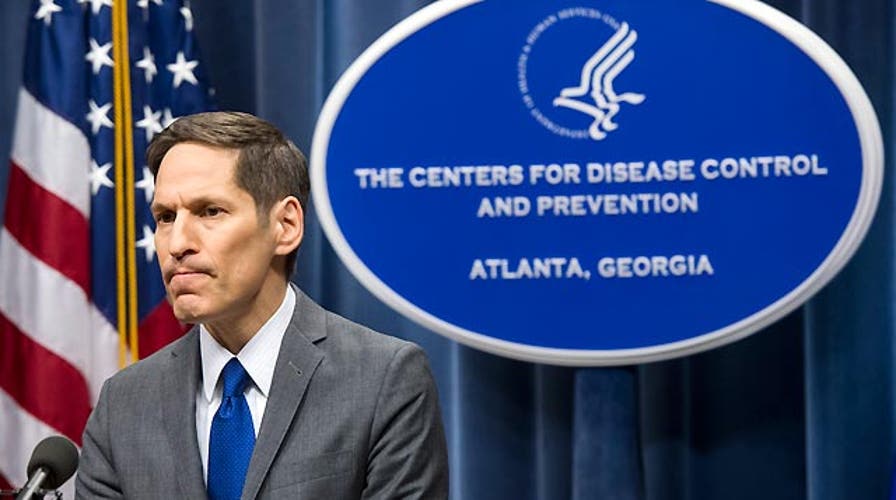This is a rush transcript from "Special Report," October 13, 2014. This copy may not be in its final form and may be updated.
BRET BAIER, ANCHOR: This is a Fox News alert. There may be another Ebola patient in the U.S. The University of Kansas hospital says an individual has come to its facility in Kansas City with a high fever and other serious symptoms. The patient reportedly had recently worked on a medical boat off the west coast of Africa, the epicenter of the outbreak. That patient has been isolated, we are told, and is undergoing tests. The facility's chief medical officer says the patient is at a low to moderate risk of Ebola and that many other diseases fit the patient's symptoms. However, he was in that area, obviously. Meanwhile, as we told you earlier there has been a confirmed case of Ebola transmission within the U.S. involving a 26-year-old nurse who gave care to the Liberian man who brought Ebola with him to Dallas.
(BEGIN VIDEO CLIP)
DR. TOM FRIEDEN, CDC DIRECTOR: Yesterday, we confirmed the first case of Ebola contracted in the United States in a health care worker who cared for who we refer to as the index patient in Dallas, Texas. Our thoughts are with this health care worker. She is now being cared for and we understand that she is clinically stable.
We have to rethink the way we address Ebola infection control because even a single infection is unacceptable.
(END VIDEO CLIP)
BAIER: More breaking news. The Associated Press is reporting is had been given records indicating about 70 hospital staffers were involved in the care of Thomas Eric Duncan who died of Ebola last week. Steve?
STEVE HAYES, SENIOR WRITER, THE WEEKLY STANDARD: You have to be concerned about the dramatic change in tone that you are hearing from Dr. Frieden there. Last week, from Dr. Frieden and some others, the tone was one of reassurance. They wanted to avoid a panic. And I think it is understandable that they want to do that. It is a delicate balance to do that but also warn people.
But last week, we were getting these reassurances and we were hearing repeatedly about how hard it was to catch Ebola. Today he is talking about having to rethink our entire approach to Ebola. That's a pretty big change. And my concern is that all of the efforts that we had initially to try this or talk down the threat, to try to avoid inciting some kind of a national panic are now going to have the effect of doing exactly that as people realize that the things that they are saying today are vastly different from the things that they said before, and, importantly, if we see more of these cases that the reassurances that we got on the front end were not accurate.
BAIER: Charles?
CHARLES KRAUTHAMMER, SYNDICATED COLUMNIST: Look, I think we are going to rethink and it's going to be done quickly. Number one, the idea, we are going to have to start evacuating patients. The idea that we are going to treat a patient at a local hospital whenever the disease pops up is insane. You can't train that many people across the country, and 99 percent of that training will be wasted because it is only going to happen in rare places.
You want to evacuate the patients to the regional centers -- in Emory University, the NIH, there were a couple of others -- where they are trained and they can handle this. Yes, it means that you take the patient away from the family. Nonetheless, this is a public health emergency.
Second, we are going to have to have a travel ban. If this patient who arrived off Liberia or off the west coast is indeed Ebola or if and when the next patient happens, there is no reason why we should be flying -- Air France, British Air have canceled. The reason given is it would stop aid going into West Africa. That's nonsense. You allow anybody who is a real aid worker to apply. State Department will look at your credentials, answer questionnaires. We'll send you over and then track you on your way back until you arrive here plus three weeks. That's not a hard problem to get around. But these things are going to have to be done and they're gotta be done soon.
CHARLES LANE, OPINION WRITER, WASHINGTON POST: You know one of the worst parts of all this is it is happening in the middle of the last month of an election campaign. And as you guys have been reporting, there is plenty of demagoguery to go around on this. And that only I think, unfortunately, is kind of fuelling people's sense that they don't know who to rely on for information about this, because in addition to the signals they're getting from Dr. Frieden from the CDC who is an expert, they are also getting a lot of 30 second ads accusing the Republicans of causing it or accusing Mark Pryor of causing it, or this, that, and the other thing. And the whole environment now is really in need of some competent, authoritative figure that people can rely on. And unfortunately, we don't seem to have somebody like that.
BAIER: We will continue to follow all of this and all the details, breaking news here on Fox News Channel. That's it for the panel, but stay tuned for some lessons learned from North Korea.
Content and Programming Copyright 2014 Fox News Network, LLC. ALL RIGHTS RESERVED. Copyright 2014 CQ-Roll Call, Inc. All materials herein are protected by United States copyright law and may not be reproduced, distributed, transmitted, displayed, published or broadcast without the prior written permission of CQ-Roll Call. You may not alter or remove any trademark, copyright or other notice from copies of the content.

